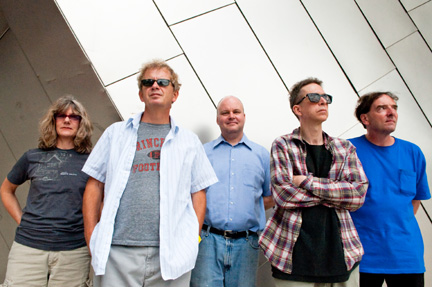Spotlight: The Feelies

Photo by Doug Seymour
In the grand scheme of rock folklore, The Feelies’ contributions aren’t particularly debacherous. In fact, the band might be the exact opposite. On the eve of the group’s first album in 20 years, Glenn Mercer smiles slightly, and clarifies: they didn’t put the chlorophyll in the coffee.
“It was one or the other,” says the politely but thoroughly reserved Mercer, who is now in his 50s and leads the band with partner guitarist Bill Million. “We wouldn’t combine the two. They don’t mix too well at all.” The chlorophyll – “a big jug of green” – filled their blood with extra oxygen and their music, a cross of CBGB tension and psychedelic jangle, with extra pep.
There is no chlorophyll in Glenn Mercer’s Haledon, N.J. basement, where The Feelies and other assorted projects have practiced since the 1980s. But there is a cup of coffee on a rec-room style corner bar, dim lighting, throw rugs and a lot of sweet gear. Incense is thick in the air.
For The Feelies, a two-decade layoff qualifies as a comeback in name only. After all, Mercer and Million took six years off between the group’s first two albums – the first of which, 1980’s Crazy Rhythms, helped inspire a young R.E.M. and Yo La Tengo. Too high-strung for life on the road and too low-key to care about career advancement, The Feelies hated touring.
In fact – in a storied bit that might be more representative legend than actual history – The Feelies even hated going to Manhattan and favored staying in the band’s hometown of Haledon, about 24 miles northwest, where one can see the Manhattan skyline from a tall hill. The group preferred to venture only as far as nearby venue Maxwell’s in Hoboken.
“We don’t go to New York much,” Million said in 1979. “We get real bad headaches going through the tunnel.”
“You just can’t breathe,” Glenn added.
The band members fussed over the same nine songs for years, obsessively rearranging the music so that it always felt new. None of which prevented them from developing a following, not to mention a Village Voice cover story lauding them as best underground band in New York in 1978.
The Feelies deeply enjoyed making music. The group did not enjoy the stress that went along with promoting it, and simply opted out. When the band was pressured to tour following Crazy Rhythms, The Feelies instead retreated to Haledon, gradually morphing into an atmosphere-obsessed side project called The Willies, who set up quadraphonic cassette loops, the sound of birds chirping in stereo at Mercer’s neighborhood bar.
There were never breakup announcements, just more bands: Yung Wu, The Trypes and, eventually, The Feelies again. A little stability followed (two albums in three years!) before Million decamped to Florida and The Feelies fireworked back out into other configurations: Mercer and percussionist Dave Weckerman’s Wake Ooloo, Brenda Sauter’s Wild Carnation.
This isn’t to say the band ever hated playing live. “We like playing, but everything surrounding it, getting there, dealing with the extra stuff,” Mercer trails off, evoking a sensibility so level-headed that a reunion seemed ordained.
“I’d always planned on doing it, for a number of years,” observes Million recently. The reunion happened on The Feelies terms, in perfect accordance with another band myth: that the group plays only on holidays. The return came on Independence Day 2008, opening for Sonic Youth in Manhattan’s Battery Park at the insistence of Sonic Youth guitarist Thurston Moore.
“We didn’t want it to be about nostalgia,” Mercer says. “Or at least didn’t want that as the overriding element. We wanted to stay vital and creative as a band.” On The Feelies’ normally relaxed schedule, which now means Million’s traveling from Florida and Sauter’s from Pennsylvania, new songs eventually emerged. Recorded in Hoboken at Water Music, Here Before immediately sounds – without qualification – exactly like The Feelies.
Within the first 24 seconds, Mercer sings about the reunion in a manner that might be described as overt. “Is it too late to do it again?” he asks. “Or should we wait another ten?” But the sound is so classically Feelies – Mercer’s voice sounds like Lou Reed if Reed had managed to stay sweet – that the tune would’ve made just as much sense opening any previous Feelies record. In a long, slow career, Here Before is an almost gently celebratory milestone.
Mercer’s basement practice space – and by extension The Feelies themselves – are just as far from Manhattan’s bustle and the music industry’s mechanisms as they have ever been. Forty-fives decorate the walls. The smell of incense is thick. Sometime soon, The Feelies will reconvene. Perhaps they will learn a new cover song. As Mercer sips his coffee, a doorbell monitor provides a wash of ambient hiss. The vibes are good. Time passes slowly. No headaches here.



















